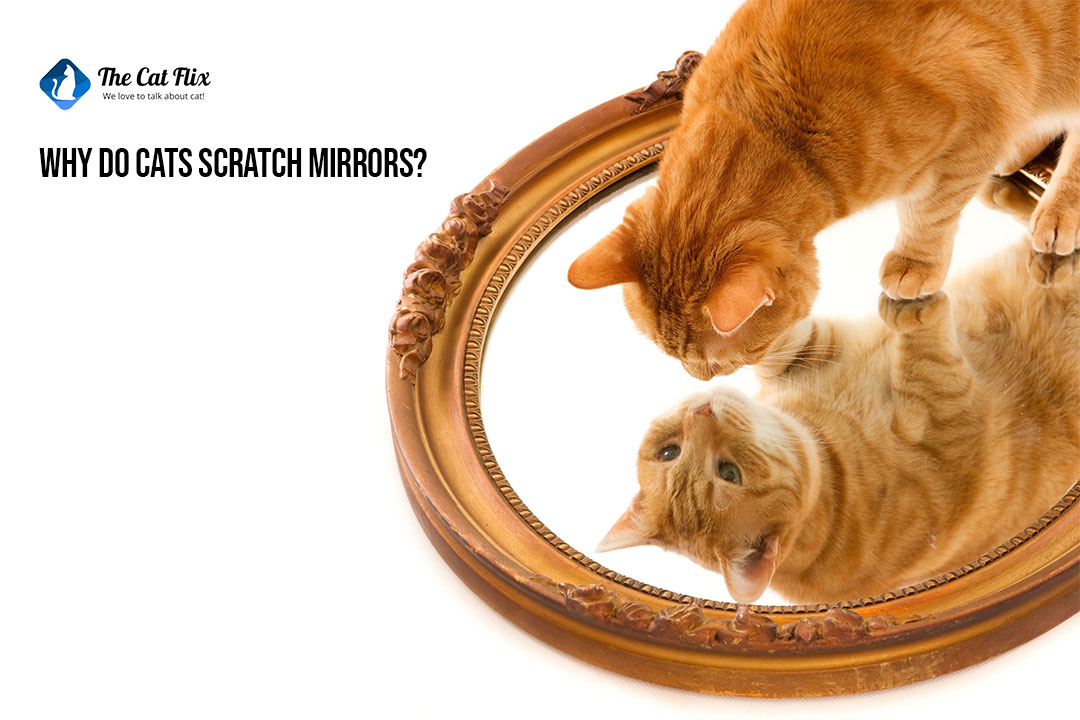Cats are known for their weirdness. They do things that make us laugh, scratch our heads, and sometimes worry. But Scratching a Mirror? Read this Article to know How To Stop a Cat From Scratching a Mirror.
As a parent of two adorable furballs, I have experienced many of their quirks – from rubbing their face on my phone, slapping me with their tail, to nibbling my fingers or making chirping sounds. Their bizarre behaviors can keep us amused for hours, making us curious about the reasons behind their actions.
One behavior that makes us curious is scratching the glass or mirror.
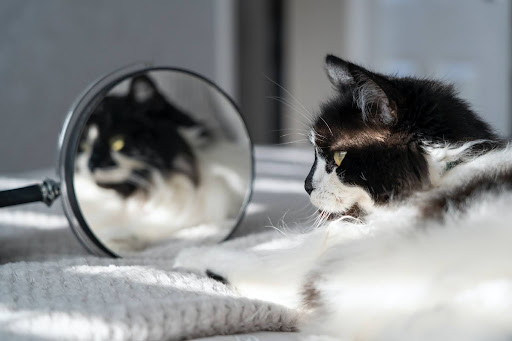
While it is not very common, this scratching can be real pain (literally, for your mirror), and especially in the middle of night when you are in deep sleep, Ugh!.
That’s why Catflix is here today to help you figure out why cats scratch mirrors and how to stop their mirror-scratching escapade.
Why Do Cats Scratch Mirrors
Cats – in one word they are true masters of the drama world. In one way they charmed us with their cuteness, on the other hand they annoyed us with their uncontrolled mischief.
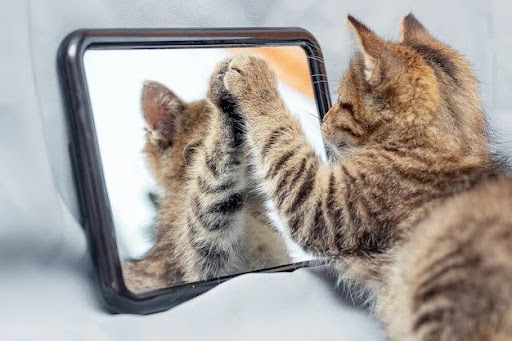
Just like scratching the mirror or reflective surface. But what makes them do such a thing? Here the answer of “why”-
Exploring Mirror Mystery
Let’s face it, cats are naturally curious creatures. That mysterious, shimmering surface reflecting their every move is simply too alluring to resist.
Scratching becomes a way to investigate the unknown, trying to understand the “other cat” seemingly trapped within the glass.
Seeking For Attention
Sometimes, scratching is a cat’s way of saying, “Hey, look at me!” If you find yourself reacting to their mirror antics, even with scolding, they might just be enjoying the interaction, even if it’s negative.
Turning Mirrors Into Territories
Cats have a strong territorial instinct, and scratching is a natural way to mark their domain. Your mirror, with its prominent position, might just become a prime spot to leave their scent and declare it theirs.
Scratching is Zen!
Scratching is a deeply satisfying and calming activity for cats. It helps them stretch, remove loose fur, and maintain healthy claws. The smooth surface of a mirror can be particularly attractive for this ritual, providing a firm grip and a satisfying sound.
Personal Manicure Station
Imagine having your own personal manicurist available 24/7. Your cat might view the mirror as just that! Scratching helps sharpen their claws and remove dead outer layers, keeping them in tip-top shape for all their climbing and hunting adventures.
Who Is This Other Cat?
Some cats might not recognize their reflection in the mirror. This can lead to confusion and even fear, resulting in them swatting at the “intruding cat” in an attempt to defend their territory.
Scratching Sounds Are Satisfying
There’s something undeniably mesmerizing about the sound of scratching on a hard surface. The rhythmic rasping can be strangely calming and even stimulating for your cat, providing a sensory experience they find enjoyable.
Do Cats Have an Obsession with Mirrors? Why?
Cats, with their enigmatic personalities and quirky behaviors, never cease to amaze us. One such peculiar habit that often leaves cat owners scratching their heads (pun intended) is the inexplicable urge to scratch mirrors.
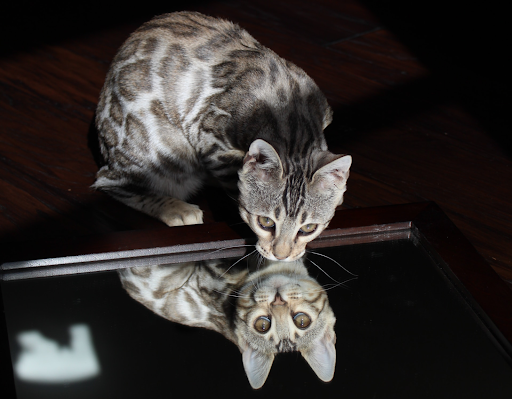
While it may seem like a random act of mischief, there are several fascinating reasons behind this behavior as mentioned above.
Talking about obsession with mirrors, well, some feline friends develop a fascination with these reflective surfaces. As I said, “curiosity” – one of the powerful motivators for cats.
The smoldering surface, seeing their own reflection, copycat movement, everything just is simply too tempting to resist. It’s like a never-ending puzzle, keeping their minds engaged and their claws sharp.
Stealing attention can also help to grow this mirror scratching obsession.
Cats are masters of communication, and if they discover that scratching the mirror gets a reaction from you, they might use it to their advantage.
Sometimes, mirror-scratching can be a sign of stress or anxiety. A change in environment or routine can trigger these emotions in cats, leading to them seeking comfort in familiar behaviors like scratching.
Do All Cats Have an Obsession With Mirrors?
However, not all cats are mirror-obsessed. Some may show little to no interest in them, while others may become completely fixated. The degree of fascination can vary greatly depending on the individual cat’s personality, age, and experiences.
Are Health or Behavioral Issues Related To Cats Scratching Behavior
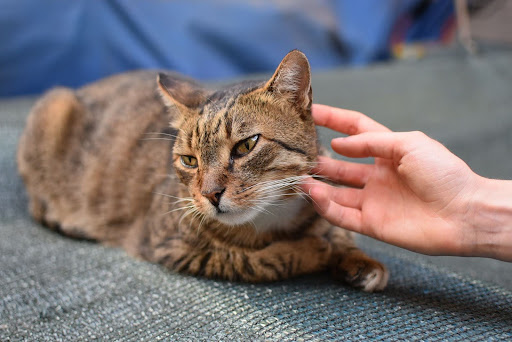
While scratching is a natural and healthy behavior for cats, excessive or compulsive scratching can sometimes indicate underlying health or behavioral issues. Here’s how to differentiate between normal scratching and potential concerns:
Normal Scratching:
- Occurs infrequently.
- Primarily focused on specific scratching posts or surfaces.
- Doesn’t cause damage or excessive noise.
- Accompanied by other normal cat behaviors, like grooming and playing.
Potential Concerns:
- Frequent and intense scratching, especially outside designated areas.
- Excessive vocalization or aggression while scratching.
- Visible damage to furniture, carpets, or other objects.
- Signs of pain or discomfort in the paws or claws.
- Changes in appetite, litter box habits, or other behavior.
Possible Underlying Causes:
- Medical issues: Skin conditions, allergies, parasites, arthritis, or other medical conditions can cause itchiness and discomfort, leading to excessive scratching.
- Stress or anxiety: Changes in environment, new pets, or other stressors can trigger anxiety in cats, manifesting as increased scratching.
- Boredom: Cats need physical and mental stimulation. Lack of engaging activities can lead to destructive behaviors like scratching.
- Compulsive disorder: In rare cases, excessive scratching may be a sign of an underlying obsessive-compulsive disorder in cats.
How To Prevent Your Cat From Scratching Mirrors
Remember, in my last article, I tackled the battle against cat-shredded couches. Now, our feline friend has added another item to their ‘scratching list’ – mirrors!
Don’t worry, we all know our furry companions are adorable mischief-makers, but even happy pills need a little guidance sometimes. That’s why I’m here with 6 solutions on how to stop your cat from scratching your mirrors.
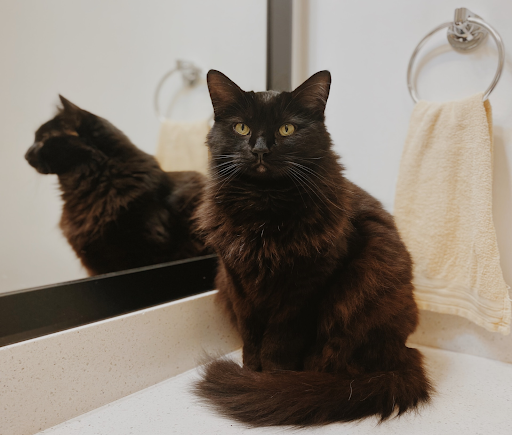
Out of Sight, Out of Mind
Covering the mirror can be the first and simple attempt to prevent scratching. This might seem like a temporary solution, but it can be effective in breaking the scratching habit. Use a large towel, blanket, or opaque film to cover the mirror when your cat is unsupervised. Also you can apply the “time-out” method to your kitty.
Distract and Conquer
One common and effective try is Redirect their attention. When you see your cat approaching the mirror, offer them an alternative scratching post or an interactive toy. This will help redirect their energy and provide a healthy outlet for their scratching instincts.
Another key prevention is Playtime. Regular playtime helps tire your cat out and prevents boredom, which can contribute to destructive behaviors. Engage them in interactive games and provide stimulating toys to keep their minds and bodies active.
Stick to It
Use some sticky tape, double-sided tape, or contact paper on the mirror. Also, you can apply them to the bottom of the mirror frame or the surrounding area. Cats dislike the sticky sensation and will likely avoid the area.
Also you can use citrus scent. Cats generally dislike citrus smells. Place lemon peels or orange slices near the mirror to deter them from scratching.
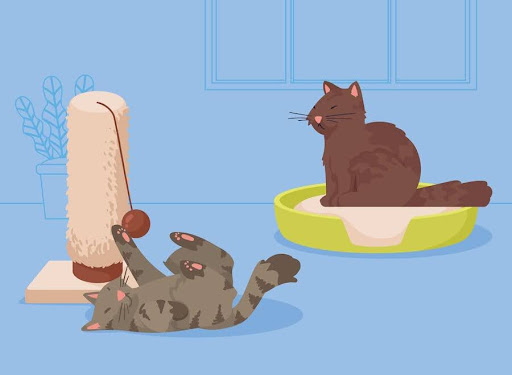
Scratch That!
Scratching post – this one thing that is commonly recommended by vets and animal behaviorists. To be honest, it’s a truly effective solution as well. So, agreeing with those experts, and applying this solution personally, i will also suggest you to provide adequate scratching posts.
Make sure you have several scratching posts strategically placed around your home, especially near areas where your cat spends a lot of time. Choose different textures and materials to cater to their preferences.
It’s Trimming Time
Trim! Trim! Trim!
Keeping your cat’s claws trimmed on a regular basis can help reduce the damage they cause when scratching. Consult your veterinarian or a professional groomer for proper trimming techniques.
In addition to the trimming session, check your cat’s nails for any problems, such as ingrown nails, nail infections, or nail injuries, and treat them accordingly.
Meow-tivation: Consult Animal Behaviorist
If you’ve tried all the above strategies and your cat’s scratching persists, consider consulting a certified animal behaviorist. They can assess the situation and provide personalized solutions for your cat’s specific needs.
What Are the Best Cat Scratch Deterrent
It’s no secret that cats love to scratch, and while it’s a natural behavior, it can wreak havoc on your furniture, especially beloved pieces like mirrors.
Fortunately, there are a variety of deterrents available to help curb your cat’s scratching habits and keep your belongings safe. But still take advice from professionals before using them. Here are some of the best options:
- Pet MasterMind Claw Withdrawal Cat Spray
- Dog and Cat Repellent Outdoors & Indoors Spray
- KatSupreme Double-Sided Deterrent Tape
- Safer Brand 5935 Critter Ridder Animal Repellent
- FUKUMARU Cat Scratcher Mat
- Sofa Scratcher Squared
- Stelucca Amazing Shields Sofa Protectors
Can Training Stop Cat From Scratching Glass
Yes, training can be a valuable tool in stopping your cat from scratching glass. However, it’s important to understand that training takes time, patience, and consistency.
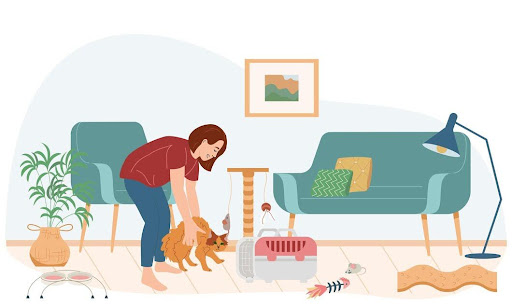
Positive Reinforcement
- Reward desired behavior: When your cat uses the scratching post instead of the glass, reward them with treats, praise, or petting. This reinforces positive associations with the designated scratching area.
- Clicker training: Clicker training involves marking the exact moment your cat exhibits the desired behavior (using the scratching post) with a clicker sound, followed by a treat. This helps them associate the click with the reward and encourages them to repeat the behavior.
Remember, consistency is key. Training takes time and repetition. Be patient and consistent with your training methods for long-term success.
Never punish your cat for scratching the glass. This can create fear or anxiety, making the problem worse.
Most importantly, be patient and understanding. Training takes time and effort. Don’t get discouraged if you don’t see results immediately.
FAQ
Why does my cat constantly scratch at closed doors?
Your feline friend might be trying to get your attention, communicate their desire to be let in, or simply mark their territory. This behavior can also be a sign of boredom or stress.
Do cats hate tin foil?
While not all cats share this aversion, many dislike the crinkly noise and slippery feel of tin foil. This makes it a useful deterrent for unwanted scratching or climbing.
Does vinegar deter cats from scratching?
The strong smell of vinegar can be a temporary deterrent for some cats. However, it’s important to dilute it properly and avoid spraying directly on your cat or near their food and water bowls.
Why does my scratch mirror at night?
Nighttime scratching can be due to increased activity levels, boredom, or curiosity about their reflection. Providing scratching posts, engaging in interactive playtime, and ensuring a stimulating environment can help reduce nighttime scratching.
Enjoy Scratch-Free Mirror and A Happy Cat!
And so, we reach the end of our exploration. Next time you see your cat scratching their reflection, remember, it’s more than just a surface.
It’s a glimpse into their curiosity, playfulness, and security. With patience, implementing these strategies can help you successfully prevent this behavior and keep your mirrors (and sanity) intact.
I hope you have found this article helpful and informative.
If you have any questions, comments, or feedback, please feel free to leave them below. I would love to hear from you and help you with your cat-related issues.

